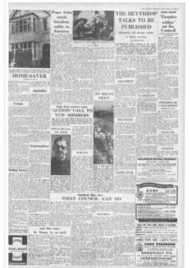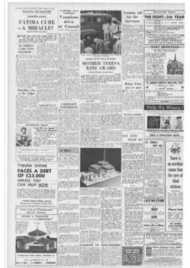Page 4, 17th August 1962
Page 4

Report an error
Noticed an error on this page?If you've noticed an error in this article please click here to report it.
Tags
Share
Related articles
East-west Detente Without Tears
Catholic ,practices Do Not Make A Catholic
And The B.b.c.
Whitetriars Fltrotticie
A Sparrow-brained Sense Of Pity Acharterhouse
Whitetriars Chronicle
PITY THE POOR PRESSMEN
AN Anglican minister concerned with broadcasting complained to me the other day that, when it comes to making public statements, "Romans tend to be more cagey than anyone else", and he pointed out that this made for pretty hopeless interviewing. I said that this was partly due to the misrepresentations we had suffered at the hands of the Press in the past, but the retort was that -you'd probably get a better Press if you were more forthcoming"; and 1 felt there was something in this. Nothing is more discomforting than to watch the cynical reaction of a pressman when any kind of spokesman gives him that halfmysterious, half-patronising smile, and presents him with a bromide. May I be pardoned for saying that civil servants, spokesmen for government 'departments and M.P.s arc especially given to this. and that we are all liable to fall into it when we have been caught slightly on the hop. Nothing annoys a pressman more than to be dragged off to an interview or press conference, there to he treated to generalising rather than ''meat". After all, the reporter has got his editor to face, and. if we don't give him the meat. he'll be tempted to hash up a plate of "fry'.
Advance Thinking
N any press conference there are I
reporters from lightweight papers and those from the heavier journals. The former need some kind of gimmick. something they can see as a headline. a simple, strong statement or two containing a clear-cut idea. appeal or challenge. This just calls for a little thinking out before the conference starts. For instance, when Winston Churchill went to Washington in 1954 at a time when we were falling out with the United States on a number of issues, he told reporters: "The Foreign Secretary and I arc just going to Washington to talk over a few family matters". This was perfect — and the reporters were highly pleased. in a sense. it said nothing. Nor, indeed, could anyone have expected the P.M. to say much more in public at that time. But it indicated, in an ear or eyecatching way. that, while we were not prepared to be pushed around, a true friendship would always allow both sides to he completely frank with each other and to use their differences as a means of getting the right answers. A serious paper, on the other hand, requires something more substantial and more reasoned. Even when you cannot deal with the question directly, it is still possible to offer something new and provocative, if you think hard enough. The spokesman must turn the tables on his questioner, not by Smart-Alec retorts. but by taking the initiative and giving him something unexpected to think about.
If you say that the popular
Press is always liable to misunderstand this, I would reply that this kind of thing is an occupational hazard of human existence, and must he faced as a calculated risk. At least make sure that the truth gels into the papers that really want it. Otherwise, we may end up by getting no Press coverage at all.
Sandwich crisis
NEARLY two years ago. I was driving down to Whithorn from Glasgow for the opening of the new Church of St. Ninian on the site of the original Candida Casa. where Scotland's first apostle set up shop. On the way, we stopped at a well known hotel in an important seaside town. and asked for coffee and sandwiches. The attractive young lady confronting us gasped. and said we could have coffee and biscuits. Sandwiches? Mid-morning? It seemed it was simply not done. We pressed the point and asked what it was that made sandwiches such a problem, and were told in the end: "You see. they'd have to he cut!" It was our turn to gasp. We got them in the end, but only after a kind of summit conference. This terrifying attitude of "take it or leave it" is the death of the concept of service in this country. About the same time, a correspondent had written in a northern paper of a similar experience. in his case, the menu said "Apples and Custard". But he just wanted apples. This, it seemed. was asking too much. Even the manager shrank from asking the kitchen to refrain from pouring the custard over the fruit. But the request was finally sent. diffidently, to the cook. The cook's reply was revealing. "If the customer is going to insist on having exactly what he wants". the massage ran, "where is it going to end?" It is this kind of thing that tempts one to go off for the rest of one's life to a high mountain peak and contemplate the eternal sun.
Sayers country
ALL of which reminds me that there are few more fascinating places to go for a holiday than Whithorn — on the rugged Wigtownshira coast '-provided you are the sort of person who just likes to hug the sea. and climb the rocks. and feel a really strong wind. If you have a car, you can roam all over Galloway, and visit what I always think of as "Dorothy Sayers country" — the territory of artists and river fishermen which forms the background of her "Five Red Herrings-. It was a great act of faith, on the part of Bishop McGee. to build a new church on the site of Scotland's "Canterbury", where an annual national pilgrimage takes you back to the days of Ninian, who went to Rome, brought the faith back in all its richness, and on the way derived inspiration from a visit to St. Martin of Tours Whithorn is a little town, and there are only a couple of hundred local Catholics. But the associations are sacred and deeply loved. It is in such areas that struggling parish priests have for many years developed those close ties with our separated brethren that account, in the long run. for the real drive in the ecumenical movement.
On a more earthy level, I have the happiest memories of a night in "The Grapes". with fires banked up hign and the wind howling outside, when I sat down to a superb supper of grilled salmon, rare cheeses and Irish coffee. They put you up there, too, very comfortably. As the proprietor is a friend, I have no compunction about recommending his hostelry to energetic young Catholics with transport. (I think the nearest railway station is 30 miles away.)
'Soda!' priests
I RECENTLY heard the story of
Fr. Matt, the Canadian Jesuit, who has now returned home after heading a university in Addis Ababa, which is now a constituent college of the national Haile Selassie University. It will have to be told in these columns some day but, for the time being. it reminded me of the extent to which the Church abroad works in partnership with non-Catholic and secular bodies. This is of paramount importance for our time, and brings us into dialogue with so many people who would otherwise be living virtually in another world from Catholics. Foreign governments arc advised by French priest-economists. Priests teach in secular universities in many parts of Africa and the East. One thinks of the non-Catholic governor of a colony who asked Rome if, in his next appointment, he could take with him the priest who had established a credit union network in the first port of call with great success. Action Populaire has produced Fr. Henry de Esrey, for instance, whose forthcoming book on European agriculture is certain to be among the leading authorities for Common Market purposes. I remember how during his recent visit to London, a bare reference to something as prosaic as fat stock prices would bring the light of battle into his eye ! am told that the Milk Marketing Board laid out the red carpet for him. Often enough. .it is the places where the Catholic population is smallest that yield the richest results—like the famous priest mayor in South Wales, and the scattered clergy in small parishes in the north of the Principality who become pillars of the local civic and social bodies. It would be good to see more of this in England itself.
Pious pubs
THOSE who like to combine good food with a dramatic setting will find both at "The Angel", un the border of Bermondsey and Rotherhithe, on the south side of London river. Sitting by a window just above the water, you can enjoy the unique mauve twilight that descend, on the Pool of London, blending the finest view of Tower Bridge and the great cranes rising above the wharfs with many ancient associations. Just across the river. near Wapping River Police H.Q., is Execution Dock, where the pirates hung in chains, to be released only if they survived three tides (hence the phrase "come hell or high water"). It was here that Judge Jeffreys of the Bloody Assize was seized by the mob and done to death. Had he not paused at the nearby "1 own of Ramsgate" la hostelry still thriving) for food, he might have dodged them. Sitting in "The Angel" the other night. 1 thought of all the pubs in Britain which have sacred associations with the English Martyrs. for a tavern was the one place where they could stay without jeopardis ing the host. Innkeepers were bound to accept any traveller who could pay. and thus were able to set the laws governing inns against the laws forbidding Englishmen to harbour priests. There is material here for a book on inns in penal times. I commend the idea to Er. Bamber of Dodding Green.
Brother Albus
blog comments powered by Disqus









